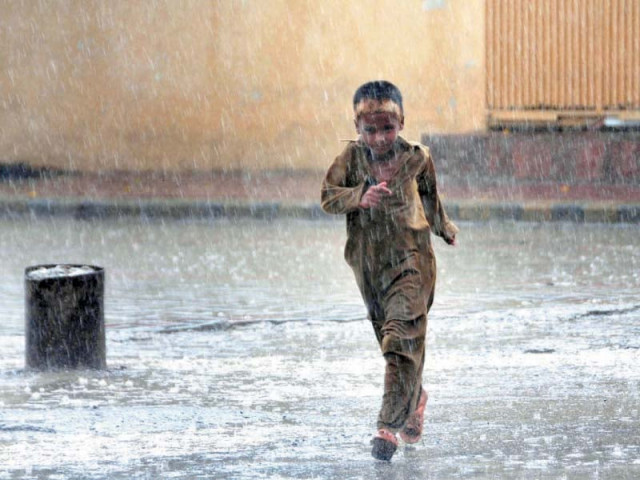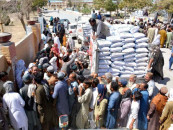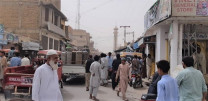Two provinces in for more rainy days
Balochistan, K-P govts struggle to cope with looming disaster magnitude

With another spell of Pakistan’s menacing early season ‘nor’easter’ start battering Khyber-Pakhtunkhwa and much of Balochistan from Wednesday – a region already scarred by deadly extreme weather this week – government agencies on Tuesday struggled to cope with the disaster of this magnitude.
Moreover, the Federal Flood Commission (FFC) said that River Kabul had been flowing in a very high flood at Nowshera, with a water discharge of 212,000 cusecs.
According to FFC report, River Swat was also flowing in a medium flood at the Munda Headworks but with a decreasing trend.
Kabul and Swat rivers, and their respective tributaries have been experiencing flash flooding due to torrential rains in the catchment areas, the bulletin further read.
Flood affectees in Hanna Urak, one of the suburbs of Quetta are in a desperate need of support.
“My house is completely washed away in floods,” Muhammad Iqbal lamented with tears in his eyes in Hanna Urak area of the provincial capital.
Flash floods unleashed by heavy rainfall have so far claimed nine lives in various parts of Balochistan, in addition to leaving people homeless in Hanna Urak and other parts of Balochistan.
They were critical of the authorities for not turning up in the flood-affected area. “After decades of hard work, we were able to construct eight-room house,” Iqbal narrated. He said that the family spent days and nights to construct the house. However, within no time, the house was razed to the ground and washed away by floods.
The Balochistan government has declared urban flood emergency to tackle the situation. All private and public schools remained closed in Quetta and other parts of the province in the wake of heavy rains. The provincial government also cancelled all leaves of the employees and officers to tackle the situation.
“At least, the government should provide shelter and food to us,” Muhammad Iqbal stated.
The affected people were provided shelter by their relatives in the area.
Tourists were suffering a lot because of the poor road condition. “Look at the road condition which is a shambles,” he lamented, adding “We cannot drive on it,” Muhammad Qasim, a young tourist complained.
He said, “It has been two years since the road was washed away by floods. The government has not been able to reconstruct it. “Balochistan Chief Minister Mir Sarfaraz Bugti should take notice of the miserable condition of the road,” he demanded.
In K-P, Charsadda and Nowshera districts were the worst hit as a large swath of land was submerged in water after River Kabul broke its banks.
Heavy rains inundated subways and transformed highways into rivers, marking the wettest day in the district since last year’s downpours. Fruit orchards in Khyber-Pakhtunkhwa’s Swat, Shangla, and Dir districts suffered extensive damage, while standing wheat crops on hundreds of acres of land were adversely affected by the flooding.
In K-P, the financial burdens on affected farmers were exacerbated as flash floods from the Punjkora and Kabul rivers submerged standing wheat crops, particularly in low-lying areas and riverbed regions of Nowshera, Peshawar, and Charsadda districts.
Kamal Khan, a 28-year-old progressive wheat farmer from Mohib Banda village in Nowshera district, expressed concern over the devastating impact of climate change-induced weather patterns.
Recent torrential rains and high floods in River Kabul have wreaked havoc on wheat crops, leading to delays in the harvesting process in K-P.
Kamal, who owns five acres of agricultural land south of River Kabul, is particularly worried about the state of his wheat crops. His fields were completely inundated by gushing floodwaters on Tuesday morning. Along with his three brothers, Kamal spent the entire day tirelessly pumping out flood and rainwater from his fields, hoping to salvage his crops and commence the wheat harvesting process as soon as possible.
The K-P agriculture department was planning a survey of standing wheat crops and fruit orchard gardens affected by the rains and flash floods with a view to offering relief to the affectees.
An official of the department said that areas located along the riverbeds in Nowshera and Charsadda were most vulnerable to flash floods as was witnessed in 2022 flooding that brought havoc to hotels, agriculture, livestock, and fisheries sectors in Khyber-Pakhtunkhwa.
Meanwhile, the PDMA has dispatched relief packages for Swat, Mohmand, Peshawar, Lower Chitral, Lower Kohistan and other affected districts. Relief supplies include tents, blankets, kitchen sets, hygiene kits, mosquito nets, mattresses and other necessary items.
Apart from this, a disbursement of financial assistance announced by Chief Minister Ali Amin Gandapur has also been started. So far, Rs30 million have been disbursed among affectees in different districts of the province.
(With additional input from APP)
Published in The Express Tribune, April 17th, 2024.



















COMMENTS
Comments are moderated and generally will be posted if they are on-topic and not abusive.
For more information, please see our Comments FAQ